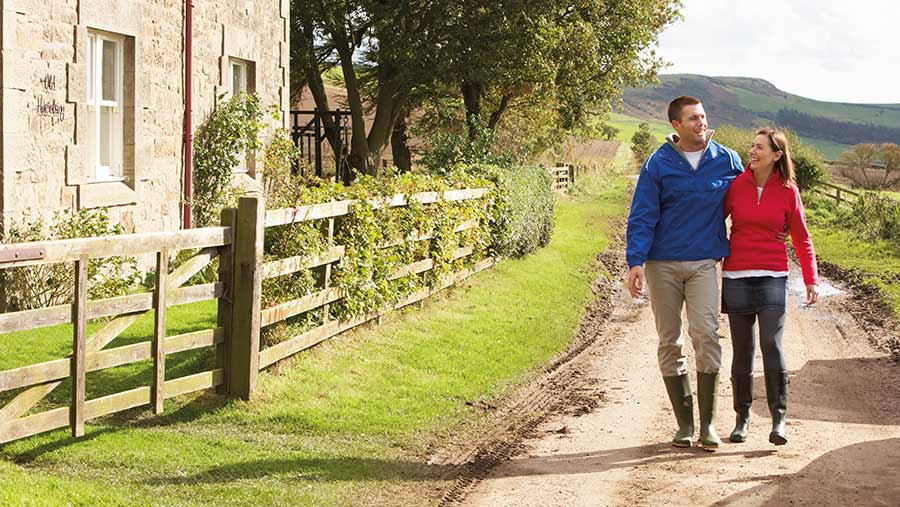Why a cohabitation agreement could help protect family farms
 © Micromonkey/Adobe Stock
© Micromonkey/Adobe Stock There has been a substantial increase in recent decades in the number of people choosing to live together without getting married.
In 2020, 18% of couples who lived together in England and Wales were not married or in a civil partnership. But in farming families, a cohabiting couple breaking up can have far-reaching and expensive implications.
Anna Garde-Evans, a senior associate in the inheritance and trust disputes department of law firm Stephens Scown, explains the benefits of using a cohabitation agreement to protect farming businesses.
What is a cohabitation agreement?
It is a legal document between unmarried couples who are living together.
It typically sets out what assets each party is bringing to the relationship, how finances will be dealt with while living together and what will happen in the event of a break-up.
See also: How inheritance promises can end up in court
“People always hope nothing will happen to their relationship, and they will live together happily ever after,” says Ms Garde-Evans.
“But, as we know, that doesn’t always happen and, quite often, a couple will struggle to reach an agreement in relation to their assets and finances at the end of the relationship because the situation may be fuelled with upset, grief and anger.
“It will bring certainty and comfort to a cohabiting couple about what will happen to their finances and assets if the relationship ends, because it will be written down and agreed by your partner.”
Why is it so important for farming families?
Having an agreement in place protects the interests of both parties and any other family members who could be affected. This is particularly important for farmers and their families, who often have significant assets at stake.
For example, a farmer’s son or daughter might ask their partner to move into a house on the family farm.
A few years later they split up and the partner decides to move out. However, they subsequently make a claim for an interest in the property on the grounds that they have, for example, made a financial contribution to the upkeep and maintenance of the property – perhaps by paying towards home improvements on the basis there was an intention for her to gain an interest in the property – or by contributing to a mortgage.
This could mean that following the end of the relationship, the farmer’s son or daughter might need to find enough money to buy out the interest their former partner gained in the property.
This may be difficult to extract from a farming business without the sale of land or another asset, or could result in serious cashflow problems.
If there is a written cohabitation agreement in place, then everyone knows whether a partner has a valid claim for an interest in the property.
Without one, arguments tend to arise, with one party claiming they do have a claim and they remember conversations to that effect, while the other argues that it is not the case. This is when things end up going to court – which is expensive.
What can an agreement cover?
An agreement can differ according to your individual circumstances, but might include:
- Confirmation of ownership of any assets
- Who is going to pay for what and whether they are going to get an interest in the property if they contribute towards it financially
- How long the cohabitee can stay before they need to find alternative accommodation if the relationship ends
- Whether there will be a joint account
- Nominations for death benefits in respect of pensions
- Agreement that any debts you have going into cohabitation remain your own
- What happens to any pets – who gets to keep the dog or cat?
“Most importantly, it will confirm your intentions in respect of the property you are living in and whether your cohabiting partner will gain an interest in the property should they contribute towards it or make any financial investment,” says Ms Garde-Evans.
“But they can be very flexible. We’ve had agreements that include things such as whether someone will be added to the car insurance and how house contents will be treated.
“So, it might say everything currently in the property belongs to person X, but anything bought after that date will be divided equally and, if the relationship comes to an end, you will either agree to separate those additional contents between yourselves or they will be sold and you split the money.”

© Amnaj/Adobe Stock
Can a cohabitee have no claim on a property, even if they have contributed financially?
Yes. A cohabitation agreement can specifically say, regardless of what you have put into this property, you will not get an interest.
This means if the relationship comes to an end there would be written evidence of the parties’ intentions, which would provide a very strong defence to any claim.
Ms Garde-Evans says that while a cohabitee might initially be happy to sign an agreement like this, if the relationship develops and there is then encouragement for them to invest money into the property, that would be a good opportunity to review the agreement.
“Having the agreement in place at the start will ensure that matters such as this will remain at the forefront of a couple’s mind when dealing with any financial investment in respect of the property – whether that would be investment or improvement works, or contributing towards the mortgage.”
Must agreements be set in stone?
The agreement is legally binding, but should be regarded as a flexible document that can be updated and reviewed as the landscape of a relationship changes.
“When we start drawing up a cohabitation agreement we always make sure we put in what is known as a determining event,” explains Ms Garde-Evans.
“This is an event where the cohabitation agreement needs to be reviewed to check it reflects the current position.
“We would always suggest a standard review date of every one to three years, but a trigger might also be if the couple were to have a child, or if one person could not work anymore due to illness or injury.”

© Khwanchai/Adobe Stock
Can you enter into an agreement even after you’ve moved in together?
You can sign an agreement prior to or once living together.
“I’ve recently been instructed to write a cohabitation agreement for a couple who have lived together for many years but, because of a change in their financial situation, they have decided to put in place a cohabitation agreement.
After 15 years, one of the parties has just received a lot of inheritance and she wants a cohabitation agreement to protect it.”
Are there any other considerations?
If someone is going to move in and start getting involved in the running of the farm, then it is also recommended that a partnership agreement is put in place alongside the cohabitation agreement.
A lot of farming families do not have partnership agreements in place that confirm who the partners in the business are, how the profits will be managed and how debts will be paid.
However, if someone moves to the farm who is going to help run the business and take a receipt of the profits, they can be deemed a partner.
How much will it cost?
Checking over a cohabitation agreement that has already been drafted will cost about £500 plus VAT.
Drafting an agreement from scratch for someone involved in a farming business where there are significant assets is likely to cost about £1,500 plus VAT.
However, if there is no agreement and a case goes all the way to a fully contested trial, the legal costs could reach £30,000-£50,000 plus VAT, even before any potential payout.
The losing party may also need to pay the legal costs of their former partner.
